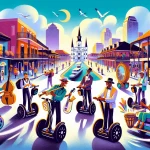Situated along the Mississippi River, Uptown New Orleans is a captivating blend of history, culture, and architectural splendor. This iconic neighborhood has enchanted visitors and locals alike with its rich heritage, diverse communities, and a unique fusion of influences that have shaped its identity over centuries.
In This Article
TL;DR
- Uptown New Orleans boasts a storied past that profoundly shapes its present-day cultural landscape.
- The area is renowned for its prominent arts scene, celebrating the city’s artistic legacy through galleries, theaters, and live music venues.
- A unique blend of architectural styles, reflecting various periods and cultures, adorns Uptown’s streets, creating a visually stunning and historically significant environment.
Historical Foundations of Uptown New Orleans
Uptown New Orleans has a storied past that dates back to the early days of the city’s development. Originally consisting of plantations during the Colonial era, the area underwent a transformation as settlers from various parts of the United States and immigrants from Europe began to establish their roots in the 19th century. Key historical events, such as the Louisiana Purchase and the annexation of neighboring communities like Lafayette and Carrollton, played a pivotal role in shaping the growth and character of Uptown.
The influence of various cultures, including French, Spanish, and Creole, is deeply woven into the fabric of Uptown’s identity. This melting pot of traditions has left an indelible mark on the architecture, cuisine, and cultural expressions that define the neighborhood today.
Architectural Significance
Notable Buildings and Preservation Efforts
Uptown New Orleans is a veritable outdoor museum of architectural styles, reflecting the diverse influences that have shaped its development over time. From the stately Greek Revival mansions and Italianate townhouses to the charming Creole cottages and shotgun houses, the neighborhood’s built environment is a testament to its rich heritage.
Notable buildings such as the grand homes along St. Charles Avenue, with their ornate details and sprawling gardens, stand as iconic landmarks. Preservation efforts by local organizations and residents have played a crucial role in maintaining the architectural integrity of Uptown, ensuring that its character remains intact for future generations.
Cultural Tapestry
Uptown New Orleans is a vibrant fusion of cultural influences, woven together by the diverse communities that call it home. The area has long been a melting pot, attracting residents from various backgrounds, including a significant African American population, as well as immigrants from Ireland, Italy, and Germany.
Cultural festivals and events, such as the annual Jazz Fest and the St. Patrick’s Day parade, celebrate the neighborhood’s rich heritage and foster a sense of community bonding. The local cuisine, with its unique blend of Creole, Cajun, and international flavors, further reinforces Uptown’s cultural identity, making it a culinary destination for locals and visitors alike.
Arts and Entertainment
Galleries, Venues, and Local Artists
Uptown New Orleans is a haven for art enthusiasts and cultural connoisseurs. The area boasts a thriving arts scene, with numerous galleries showcasing the works of local and international artists. Venues like the Mahalia Jackson Theater and the Tipitina’s Music Club have become iconic destinations for live performances, hosting a variety of musical genres that reflect the city’s rich musical heritage.
Local artists, such as the renowned writer Anne Rice and the legendary Neville Brothers, have left an indelible mark on Uptown’s cultural landscape. Their contributions have not only enriched the neighborhood but have also influenced the broader artistic community, both locally and globally.
Community and Lifestyle
Daily life in Uptown New Orleans is a vibrant fusion of community, tradition, and modern conveniences. Local businesses, from charming boutiques along Magazine Street to cozy cafes and restaurants, contribute to the neighborhood’s unique character and economic vitality.
Community initiatives and local governance play a crucial role in preserving Uptown’s distinct identity while addressing contemporary challenges. Residents take pride in their neighborhood, fostering a sense of belonging and actively participating in efforts to maintain the area’s charm and appeal.
Education and Institutions
Uptown New Orleans is home to several prestigious educational institutions, including Tulane University and Loyola University. These institutions not only contribute to the intellectual and cultural fabric of the neighborhood but also play a vital role in community development and cultural preservation.
Notable alumni from these institutions have made significant contributions to various fields, further enhancing Uptown’s reputation as a hub of academic excellence and intellectual discourse. The presence of these institutions also adds to the vibrant atmosphere of the neighborhood, with a thriving student population contributing to its dynamic energy.
Economic Impact and Development
Uptown New Orleans has a thriving economic landscape, driven by a diverse range of industries and businesses. From the bustling commercial corridors along Magazine Street to the thriving hospitality sector, the neighborhood’s economic vitality is a testament to its resilience and adaptability.
Recent developments, such as the revitalization of the Freret Street corridor and the growth of the local arts and cultural scene, have further bolstered Uptown’s economic prospects. Ongoing projects and initiatives aim to strike a balance between preserving the area’s historic charm and fostering sustainable growth, ensuring that Uptown remains a desirable destination for residents, businesses, and visitors alike.
Preservation and Future Challenges
While Uptown New Orleans has successfully preserved much of its cultural and historical integrity, it also faces challenges in balancing preservation efforts with the demands of modernization. Local organizations and community groups play a crucial role in addressing these challenges, advocating for responsible development and safeguarding the neighborhood’s unique character.
As Uptown continues to evolve, the future outlook involves finding innovative ways to maintain its rich heritage while embracing progress and adapting to changing times. Through collaborative efforts and a shared commitment to preserving the essence of Uptown, the neighborhood can continue to thrive as a vibrant and authentic representation of New Orleans’ cultural legacy.






